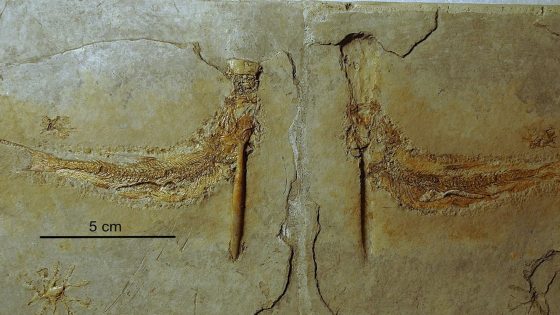A recent discovery of ancient fish fossils has unveiled a chilling fate for the Tharsis fish, a now-extinct genus of ray-finned fish. This finding, reported on 2025-07-14 21:00:00, highlights a bizarre pattern where these carnivorous fish frequently died with belemnites lodged in their gullets. Such insights into prehistoric ecosystems raise fascinating questions about the dangers faced by these creatures millions of years ago.
- Discovery of Tharsis fish fossils in Germany
- Belemnites lodged in fish's gullets
- Tharsis fish were micro-carnivores
- Accidental choking from suction feeding
- Belemnites often overgrown by bivalves
- Unpredictable challenges in ancient ecosystems
Paleontologists Martin Ebert and Martina Kölbl-Ebert meticulously studied specimens from the 152-million-year-old Solnhofen Plattenkalk formation in Germany. Their findings revealed that many Tharsis fish had belemnites stuck in their mouths, leading to tragic deaths. This unusual phenomenon not only sheds light on their feeding habits but also underscores the unpredictable challenges of survival in ancient marine environments.
This discovery prompts US to consider how feeding behaviors can lead to unforeseen consequences. Did the Tharsis fish misjudge their prey? Their suction feeding likely targeted small organisms, but the presence of decaying belemnites turned fatal. Key points include:
- Tharsis fish were micro-carnivores, preying on small marine life.
- Belemnites likely drifted passively, becoming choking hazards.
- This pattern of death is rare in the fossil record, highlighting unique ecological interactions.
As research continues, these insights may reshape our understanding of prehistoric marine life and the intricate relationships within ecosystems. What other hidden dangers await discovery in the fossil record?
































